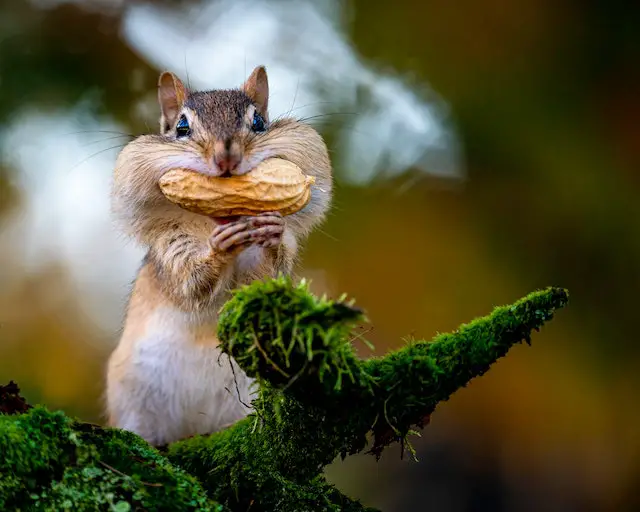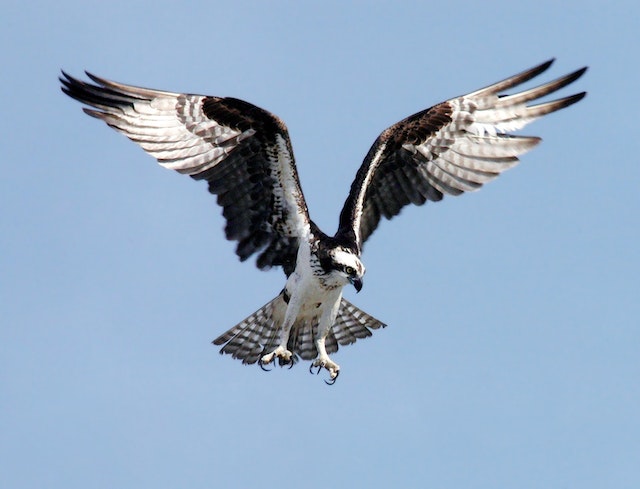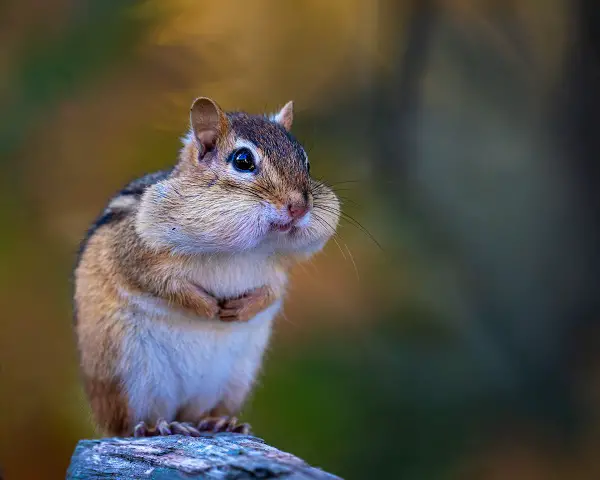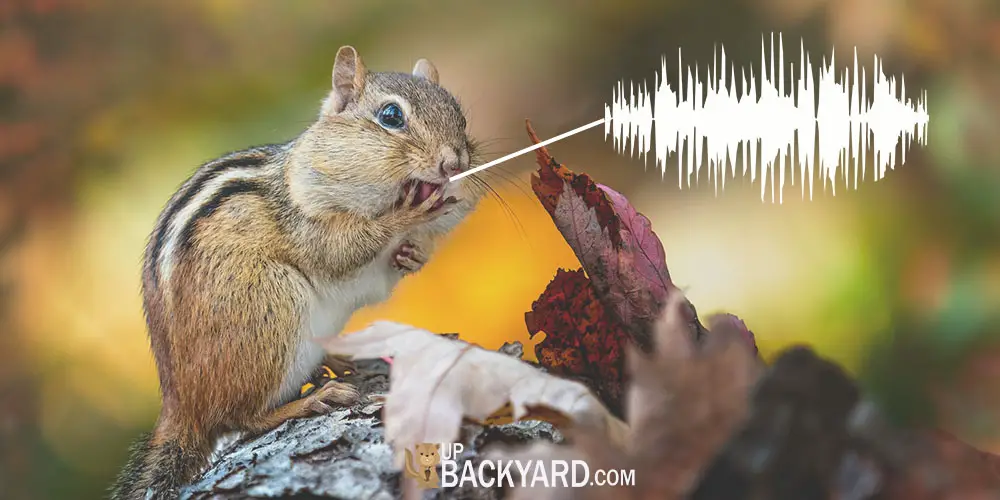Many people know what a chipmunk looks like from either seeing them out in nature or from one of the popular movies that star these tiny creatures.
Chipmunks visually look similar to squirrels, but there are many differences these rodents have.
Chipmunks make a different sound than squirrels, but do you know what a chipmunk sounds like?
Today, we will be going over what kinds of sounds a chipmunk makes and why they would be making those sounds.
What Sounds Does a Chipmunk Make?
Chipmunks are small and super cute creatures that we can often see running through a forest to look for their next meal.
When they do get that meal, you’ll see their cheeks puffed up with the food that they’ve obtained.

To know what kind of sound a chipmunk makes, all you have to do is look at its name.
Chipping Sounds
Like their name applies, chipmunks make a lot of repetitive noises that sound like chipping or even chirping.
Their chips can be a variety of notes, though they are more likely to produce high-pitched chips than low-pitched chips.
Chipping is used as a chipmunk’s warning call.
If they are faced with a predator or perceive that there is a nearby threat, they will let off a series of high-pitched chips to alert the other chipmunks around them and to try to scare off the predator.
Common predators of chipmunks include coyotes, cats, raccoons, and sometimes dogs.
Any large predators can be threatening to a chipmunk, so oftentimes they will give a warning call with any of these animals.
Chucking and Clucking
Chipmunks, along with giving off a sound that is high-pitched and chirp-like, will also give off a sound that is similar to hitting wood with an ax. This is either called chucking or clucking.
This sound is a lot deeper than chipping and serves as another warning call.
However, instead of warning against surrounding predators on the ground such as raccoons, chucking is used to warn against predators in the sky.
Aerial predators of chipmunks include owls, hawks, and other large birds. If the chipmunk can’t get away, these birds will come down and swoop the chipmunk away for lunch.

Sometimes, the predator will be deterred from pursuing a chipmunk because of the noises they are making.
Other times, these warning calls only serve to help the other chipmunks around by encouraging them to go and hide.
Having different calls for different predators helps other chipmunks know how they should hide.
When hiding from a bird, a chipmunk needs to make sure it isn’t visible from the sky. On the ground, a chipmunk needs to be completely hidden for its safety.
Thrills
The last sound that a chipmunk will make when it’s in danger is thrilling sounds. Thrills are very short and aren’t emitted more than a couple of times during the chase a chipmunk will go through.
However, chipmunks are still very noisy while they are being chased. They want to let everyone around them know what’s happening.
In a chase, a chipmunk will let off a series of high-pitched sounds that can be compared to tiny screams.
The sound of a thrill is multiple notes with a low amplitude. This sound varies a lot because it can mean different things.
However, its main meaning is that a chipmunk is done being chased and the chipmunk is safe again.
Mating Calls
All animals have their own methods to initiate and call for mating.

Even though chipmunks are typically very independent, they still have to go through a mating season to make sure that there are more chipmunks in the future.
The mating season of a chipmunk is in the spring. Male chipmunks are typically ready to start mating a few more weeks than female chipmunks are, so males will use this time to start scouting for a suitable female.
Male chipmunks will alert their presence and their reason for being in a female territory through their mating calls.
A mating call sounds like a collection of chirps and other noises that sound different than a warning call.
Again, breeding season is typically the only time when chipmunks will hang out together. Once a pair of chipmunks are done mating, the male chipmunk is driven out of the female’s territory.
Territorial Calls
With chipmunks being pretty independent and solitary creatures, they are fiercely protective of their territory and don’t want any other creature stepping through.
If they notice another creature trying to make its way into a chipmunk’s territory, the chipmunk will let them know that they aren’t allowed anywhere close.
They will let off a series of noises from powerful screams to repetitive clucking.
Chipmunks will make noises that are both high-pitched and low-pitched to make sure that no creature will be intruding. They will make sure that the noises that they make are loud enough to be heard from across their territory, which can sometimes be as big as 50 feet.
Chipmunks will not stop making really loud noises until the threat and intruder have gone far away. They don’t care how long it takes.
Intruder calls from chipmunks have been recorded to last 30 minutes. Chipmunks really don’t want intruders around.
While facing off an intruder, a chipmunk will also show territorial behavior by constantly scanning the area and stuffing its cheeks full of food. Of course, they won’t be able to have a ton of food in their cheeks to be able to make warning calls.
After the intruder has left and the chipmunk is safe again, it is likely to spend more time in its burrow to make sure that everything is completely safe.
Humans can be considered intruders as well, so if you hear a chipmunk begin to scream at you, it is best to leave the area as soon as you can.
They might not want to go and attack you, but if you get too close to a burrow, they can get vicious.
Frequently Asked Questions
Do Chipmunks Make Squeaking Noises?
Some of the vocalizations of a chipmunk can be described as being similar to squeaking noises.
High-pitched warning calls, or chipping, is likely to be similar to squeaking noise.
A chipmunk might also make a squeaking noise when they are being pursued by a predator. They will make a series of loud noises to alert the other chipmunks around that there is immediate danger, and some of these noises can sound like squeaking.
What Scent Will Keep Chipmunks Away?
Just like chipmunks will have problems with other creatures being too close to their territory, humans have problems with creatures in their territory as well.
You can keep chipmunks from being too close to your house with a variety of scents that these creatures tend to hate.
Chipmunks hate the smell of eucalyptus, clove, lemon, peppermint, cinnamon, and other strong smells.
Many creatures don’t like plants that have a really strong smell, so use that to your advantage by having these scents around and outside your house.
These scents will keep chipmunks away along with many insects. If it works, it’s a win-win scenario.
Why Do Chipmunks Make a Loud Chirping Noise?
Chirping and chipping are used to alert surrounding chipmunks that there is a ground predator nearby.
If there is a cat, dog, raccoon, or a coyote nearby, a chipmunk will let off a series of chirps as a warning call to any surrounding chipmunks.
Do Chipmunks Bite?
No animal will attack just because they feel like it. Every creature needs a reason before they go off and attack other creatures.
A chipmunk will typically be docile and won’t bite others. They are more likely to run away from a threat than to go after it.
However, when a chipmunk is left with no other choice, feeling cornered and like they will be killed at any notice, they will bite their predator.
If you make a chipmunk feel very threatened and remove its ability to run away, you will most likely get bitten.
This is why you shouldn’t ever pick up a wild chipmunk or chase it around to the point where it gets cornered. That kind of behavior will surely get you bitten, and you can face dire consequences from that.
Final Thoughts
Chipmunks are very cute creatures that can also be very loud at times. They have a collection of different sounds that they will make and there is a different reason for each sound that they give off.
Even though these creatures are highly independent, they do care about the survival of chipmunks around them and will give off warning calls so that the other chipmunks can get to safety.
If you have ever spent time around chipmunks or live in an area that has a lot of chipmunks, have you heard the noises that they have made?
Have you seen a group of chipmunks hide because of a warning call? Let us know in the comments!
@Image credits: Skyler Ewing/ Ameresh Mishra

1 thought on “What Sounds Do Chipmunks Make? + (4 FAQs)”